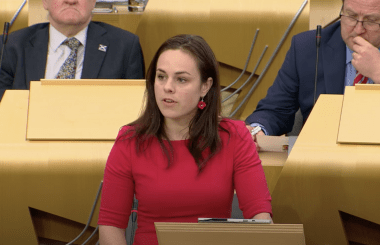
BY : Staff writer Christian Today
Scotland’s Deputy First Minister has sought to reassure Christians that there is a role for them to play in helping the country address its challenges.
Speaking at an event at the Scottish Parliament hosted by the Evangelical Alliance, Kate Forbes encouraged Christians to be confident in seeking to serve the nation and their communities in love.
“We know the big changes that have been delivered over generations in this country because of the work of Christians in the country,” said Forbes, who is a committed Christian.
“And we have a choice right now as to whether that will continue to be the case. And I want to be part of it, and I hope you do too.”
The event was held on Wednesday to mark the publication of the Evangelical Alliance’s new report, What Kind of Nation?, which sets out a number of priority areas for Christian engagement, including the economy, education, drug addiction, depopulation, and poverty reduction.
Commending the report, Forbes said: “I often talk to people and there’s an element of fear, there’s an element of worry, there are questions of whether we should get involved or not, and my response is to have that confidence to get involved.
“Because we know that the need is great, and as a church, as faith communities, there is an opportunity for us to do something that demonstrates that love.”
What Kind of Nation? has been published 10 years on from the referendum on Scottish independence in 2014. It says more attention needs to be paid to the challenges of depopulation, and calls on the Scottish government to make improvements to how faith is taught in schools. The report also features examples of the work that Evangelical Alliance member organisations are already doing in these areas.
Addressing Wednesday’s report launch at Holyrood, Conservative MSP Jeremy Balfour said: “Many of us have experience of what the churches, what the faith communities are doing, the impact that they have on vulnerable people across our society, but also other sectors as well.
“I often say to people, it would be interesting if we all went on strike for 48 hours. What would Scotland look like? And
“I think that’s a real challenge for us as politicians, to take the work that is done seriously and to recognise the importance of it and the need to be able to fund it and to support it in different ways.”
Lynne Paterson, head of the Evangelical Alliance in Scotland, asked policymakers to pay attention to the work the church is doing.
“We want to encourage policymakers that the church has got something really important to contribute and to encourage churches to be that good news within their communities,” she said.
“The member organisations that are featured in the report, represent just a fraction of the value that Christians are contributing to Scotland, and they’re all involved in this liberating good news mission.
“They’re motivated by God’s love and God’s mercy, they’ve experienced it themselves and they want to give it out. And they’re compelled by the kind of vision that Jesus came to proclaim, that we read about in the Bible, the vision that he had for a different kind of society.”
Photo: Scottish Parliament












